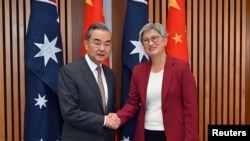Human rights and trade sanctions dominated talks Wednesday between the Chinese and Australian foreign ministers in Canberra.
Analysts say that bilateral relations are stabilizing after years of friction over various geopolitical and trade disputes, but disagreements remain.
Australia’s Foreign Minister Penny Wong said there would be a “frank exchange of views” with her Chinese counterpart, Wang Yi, ahead of Wednesday’s talks in Canberra.
Wang Yi is the most powerful Chinese politician to visit Australia since 2017.
During the talks, Wong said she raised the death sentence imposed on Yang Hengjun, a Chinese-born Australian democracy activist, insisting that “Australians were shocked at the sentence.”
Wong told reporters in Canberra that there were also discussions on human rights in China’s Xinjiang province, Tibet, and Hong Kong.
She said there would also be expanded dialogue in the future “in key areas such as the Pacific, climate and energy cooperation.”
Wong said the bilateral relationship needs to be carefully cultivated to prosper.
“A stable relationship between Australia and China does not just happen, it needs ongoing work, and this was the latest meeting in that process. As Minister Wang reflected in our meeting, it's in both our interests that we have a mature and productive relationship," she said.
Wang Yi told the news conference in Canberra that Wednesday’s talks had helped to dispel “doubts and boosting trust” and he hoped “that this sound interaction can continue further.”
China has previously voiced objections to Australia's plan to build nuclear-powered submarines with the United States and Britain.
Australia and China have slowly rebuilt their diplomatic relationship. It hit its lowest point in 2020 when Canberra called for an inquiry into the origins of coronavirus pandemic.
Beijing was infuriated and saw it as a criticism of its handling of the pandemic.
Retaliatory trade restrictions followed, but earlier this month, Chinese authorities released an interim statement that high tariffs on Australian wine are no longer necessary. The tariffs could be lifted by the end of this month. The duties were imposed in 2020 as tensions simmered between China and Australia over various geopolitical flashpoints.
Analysts have said the two countries are economically interdependent. China’s demand for raw materials has underpinned Australia’s recent prosperity.
Australian iron ore and liquefied natural gas have been key drivers of China’s economic expansion.




